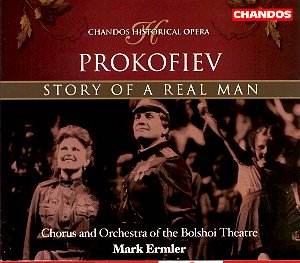Chandos continue to surprise and delight. Here they
make generally available the only recording ever made of Prokofiev's
last opera. It is based on the original stage production which opened
at the Bolshoi on 8 October 1960. A private performance took place behind
locked doors in Leningrad on 3 December 1948 but this was for the benefit
of the Party's cultural intelligentsia. The official opprobrium accorded
to it was a predictable nerve spasm in the wake of the Zhdanov condemnation
of formalism.
Tragically this opera had been something of an artist's
riposte to 'justified criticism'. Ever since Semyon Kotko (reviewed
on this site in the Philips recording by Gergiev) Prokofiev had
been striving for the perfect Soviet opera. It must have been
heart-rending for 'Story of a Real Man' to be rejected so brutally.
Even the title reached out directly to the praesidium. Here was no tale
of remote, dandyish society but the very acme of gritty wartime reality.
The message was positive - exalting Soviet heroism and yet still it
was rejected!
The scene is 1942 USSR during the Nazi invasion. The
heroic pilot Alexei is shot down behind Nazi lines and despite terrible
injuries to his feet crawls back to the Soviet side. He has prostheses
fitted and against the odds (a Soviet Bader!) learns not only to dance
but also to fly. Soon he becomes a leading fighter ace. At the end after
seemingly going missing on an interception mission he returns and is
reunited with his love, Olga.
Like Kotko the work is laid out in a series
of film story-board tableaux. In this version there are four tableaux
in Act 1, three in Act 2 and four in Act 3. Each tableau is multiply
tracked and with praiseworthy attention to detail Chandos relate each
track to the relevant pages in the libretto. The booklet presents the
sung texts in the original Russian (Cyrillic only) alongside English,
French and German. A pity about the lack of a transliteration. Its absence
makes it difficult to locate exactly where you are unless that is you
are able to handle Cyrillic.
The music can best be related to the world of the Seventh
Symphony - a work most unfairly derided - and to Kotko itself.
Irresistible popular elements fraternise with steely shimmering magical
effects. Listen for example to the Prokofiev equivalent of the ‘presentation
of the rose’ with its trembling trumpet at (tr.12 CD1: 1.40) and the
shrill strings. This is to returns in tr.10 act 2 as part of the mid-act
interlude. Hear also the resolute yet winsome tone of the Song of
the Collective Farmers in tr.1 and tr.11. Popular light opera puts
in an appearance in Kukushkin's Song - a swashbuckling encore
piece with its urgent cries of ‘Anyuta’ (CD2 tr.7). Alexei's scene with
the commissar is distinguished by the moonlight (‘immense and silent
moon’) suggested by shimmering violins similar to the mysterious moonrise
in Vaughan Williams Dona Nobis Pacem.
All the voices have the authentic ring that we associate
with Golden Age Soviet operatic practice. This is especially true of
the men and I would particularly single out for praise Yevgeny Kibkalo
(Alexei, the pilot) and Artur Eizen (the Commissar). Chandos have wrought
wonders with the sound. Analogue hiss from these forty-plus year old
stereo tapes has been deeply subsumed and the resoundingly natural and
grand musical signal emerges. Bass rumble is occasionally heard often
at the start of a tableau but the sound itself is as stable as you could
possibly want. The voices are rendered with gripping immediacy, every
breath intake is caught. On the debit side this recording is not the
full opera but a version with significant cuts and with scenes rearranged.
The excellent notes are by Daniel Jaffé.
This disc inaugurates Chandos's 'Historical Opera'
series. I have my fingers crossed that they have some of the other 1950s
and 1960s Melodiya opera tapes in their sights. I believe that there
are Melodiya tapes of Betrothal in a Monastery.
The way remains open for Edward Downes or Gergiev to
give us a complete version. We certainly need one. Even when one appears
this set will retain its magnetic charge and its relevance as a vivid
audio account of how this work first emerged into the world: fallible,
damaged, but salty, emotional and valiant.
Rob Barnett

